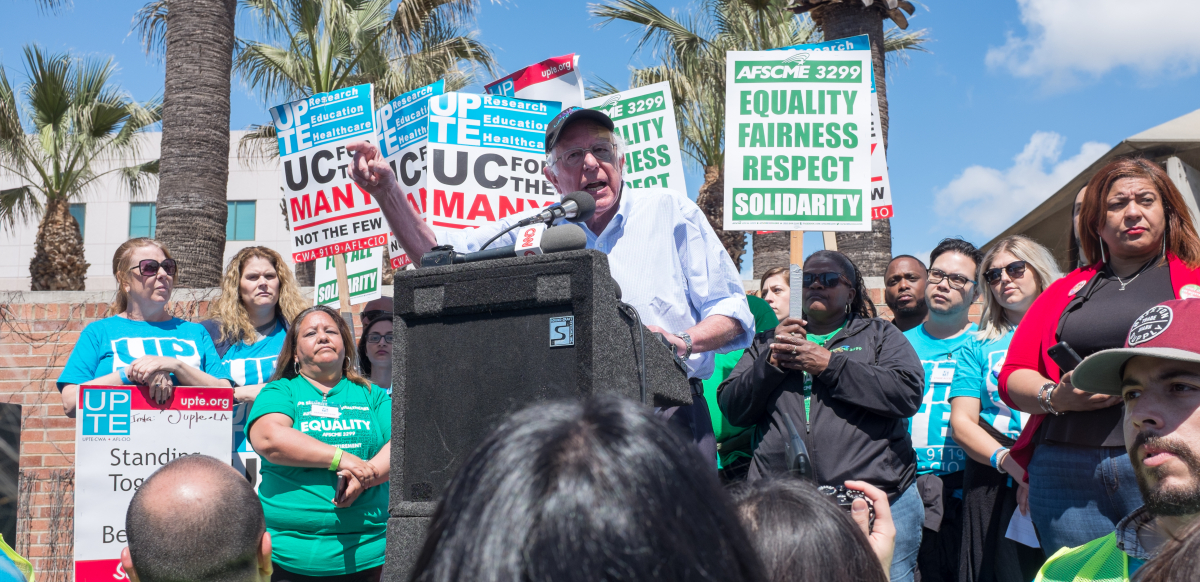One Local Union's New, Improved Endorsement Process

Senator Bernie Sanders spoke on an UPTE picket line in Los Angeles last year. The union endorsed him in advance of California’s March 2020 presidential primary. Photo: UPTE
For 2020, our local’s executive board set out to construct a more democratic and participatory endorsement process than we had ever had before.
First, a little background. University Professional and Technical Employees (UPTE-CWA Local 9119) is a statewide local representing more than 15,000 employees spread over 600 miles. Members work at 10 University of California campuses, three Department of Energy laboratories, and three community colleges.
In 2015, by a vote of our executive board, we endorsed Senator Bernie Sanders for president because he was the only candidate who represented a militant, pro-worker agenda. Later that year our national union, the Communications Workers (CWA), polled its entire membership and also endorsed Sanders.
But last year, in advance of California’s March 2020 presidential primary, we decided we could do better by engaging our members to participate directly in choosing whether and whom to endorse. We believed this would produce a stronger commitment to a shared political purpose.
Our executive board developed a deliberative, democratic process and schedule. The plan was implemented by a committee of 14 member activists, selected from among those who responded to an open invitation sent to all our chapters. We relied on this engaged and hard-working committee to push the process forward.
Here’s how it worked:
Parameters: First, the committee and executive board voted unanimously to focus only on candidates with pro-union records who opposed “right to work” laws. This eliminated Republican candidates. We also chose to focus on those candidates who were most likely to make an impact on the race, based on months of political polling.
IDENTIFIED TOP ISSUES
Survey: We began with an issues-based survey, emailed to all members. It asked them to prioritize which issues they cared most about and which candidates they were most interested in hearing from.
The committee also assessed how each candidate’s platform aligned with positions that our union’s delegate assembly and executive board had voted to support over the years. For instance, we looked at their positions on Medicare for All, the Green New Deal, and the California Master Plan for Higher Education—all of which UPTE supports. We used this information to develop interview questions.

SUPPORT LABOR NOTES
BECOME A MONTHLY DONOR
Give $10 a month or more and get our "Fight the Boss, Build the Union" T-shirt.
Interviews: Five candidates received double-digit votes in the initial poll, so we reached out for interviews with those five. Joe Biden’s campaign did not respond to two requests, so he was ruled ineligible.
We conducted teleconferences with Bernie Sanders and with representatives of Elizabeth Warren, Pete Buttigieg, and Andrew Yang. All members could listen live, and afterward the recordings were on our website. We asked about the four top issues that members had identified: income inequality, worker and union rights, health care, and climate change.
Issues analysis: After the interviews, our policy subcommittee did an extensive analysis of where these four candidates stood on the issues. We put this analysis on our website and publicized it to members by email and social media.
Vote: We emailed all members about the opportunity to vote for an UPTE presidential endorsement and also flyered in workplaces. Our email included a link so members could confirm that they were registered to vote in the presidential election. We allowed nine days for voting.
When the votes were counted, it was very clear whom members preferred. Sanders received 66 percent; Warren was next with 22. We announced the results in an email that encouraged members to vote in the primary.
BERNIE LANDSLIDE
Our self-criticism is that we wished we had greater participation in the vote. Our process by definition eliminated some of our members’ choices—Republicans, candidates from other political parties, Biden, and lower-polling Democrats. The process for this endorsement was developed by the member-run committee and is not immutable; we may choose to do some things differently in the future. For instance, next time we may want to allow a longer voting period and do more member-to-member workplace recruitment for the vote.
Nonetheless, our announcement (via email, social media, website, and press release) attracted a huge amount of interest from our members and the wider world. And although our endorsement result was the same as four years ago, we feel that a process with greater member involvement was well worth the additional effort.
We are now following up with members who participated in this process; many of those who were active in our contract campaign are now turning their efforts to canvassing and get-out-the-vote efforts.
Joaquin Chavez is the vice president and Lisa Kermish is an executive board member of UPTE-CWA Local 9119.





